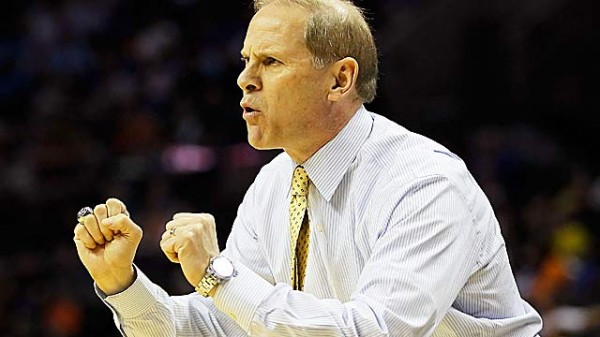John Beilein’s Contract Extension Is No Mystery
Posted by Chris Johnson on July 18th, 2013Chris Johnson is an RTC Columnist. He can be reached @ChrisDJohnsonn.
Anytime a coach signs on the dotted line for a substantial raise, the occasion for historical praise and legacy analysis and career achievement evaluations is ripe. Michigan coach John Beilein gets the treatment following Wednesday’s official announcement of a three-year contract extension guaranteeing a $2.45 million salary over the next six seasons. Beilein’s rise was explored in depth during Michigan’s recent national championship run, but with a few months distance from the accomplishment, and a fat raise show for it, Beilein and his long career warrants further review. The statistic you always hear about Michigan’s well-compensated coach is that he’s the only coach ever to win 20 games at the NAIA, Junior college, Division III and Division I levels. The other popular distinction on Beilein’s resume – and this one somehow feels even more unique, even if it’s not – is the fact that he has never once been an assistant coach. Through the meandering path that saw Beilein rise from Newfane High School to the brink of a national championship, Beilein has enjoyed master control the entire way.
Those are interesting points, and there are plenty of other notable bullets on Beilein’s CV, but arguably the most interesting (and the most timely) comes from this past season, where Beilein pushed Michigan to a place few believed the Wolverines could ever reach just two decades following the crippling Ed Martin scandal. For the first time in his long and storied career, Beilein had a roster full of real, athletically gifted, elite high-level athletes. They were good basketball players, too, all of them: from Trey Burke to Mitch McGary to Glenn Robinson III and on down the line. In his previous coaching stops, including much of his recent tenure at Michigan (even as recently as 2011-12, when relatively unathletic players like Evan Smotrycz, Stu Douglass and Zack Novak were key contributors), Beilein resigned himself to the humbling fact that – without elite athletes to play hard man defense, and run traditional ball screen and pick and roll offenses – he needed schematic quirks, eccentric offensive sets, and untraditional defensive strategies to beat opponents not with superior basketball talent, but with sideline acumen and tactical wit. They were smart concessions: the 1-3-1 defense, the two-guard front offense, and whatever other means Beilein used to veil his teams’ typical lack of athleticism. Beilein needed a way to level the playing field against bigger, tougher teams, so he adjusted to survive. And with sporadic evidence to the contrary, Beilein’s tactics worked. His teams got by. Kevin Pittsnoggle did this. Things clicked.
Then last season’s recruiting class came along to fill out a starting lineup that already had impressive athletic talent, and Beilein revamped the basic strategic principles he’d known and preached and trusted to his core for nearly 40 years. Why? Because the players he had at his disposal – the McGarys and Burkes and Hardaways and GRIII’s, all drilled in unison to form the most efficient offense in the country, per kenpom.com – were unlike anything Beilein had ever coached before. Beilein was able to turn his players loose in standard offenses and classically grinding man defenses (although Michigan never quite put it together on that end of the floor), and the results were spectacular. Perhaps this is no coincidence – Beilein, remember, has never been an assistant coach. It’s not difficult to wrap your head around the idea that over the course of his gradual climb to the top of the high major coaching ranks, he was never able to get these types of players. Finally established as the basketball stalwart its massive fan base and sprawling alumni and athletic department budget implied it could be, Michigan (and Beilein) doesn’t need to scheme its way to victories. It has the athletes and individual talent to match most any squad in the country. Beilein’s sideline wizardry is a bonus.
Following last season’s national championship run, and the completion of another top-15 recruiting glass, I’m starting to get the feeling Beilein won’t have to fear reverting to his old, gimmicky, distinctly-Beilein style any time soon. It doesn’t have to go away completely, of course; Beilein will never abandon every tactical edge and stratagem that pushed him to the top of his own profession. Even so, there will be changes. Last year was a perfect distillation of what an athletically gifted Beilein team is capable of, and what they promise to look like going forward. As in: more Burkes and McGarys and less, well, whoever played for Canisius between 1992-97.
My deepest regards go out to any Beielein-coached player that didn’t partake in last season’s title run, but facts are fact: Beilein has players now. That’s the biggest difference.













































